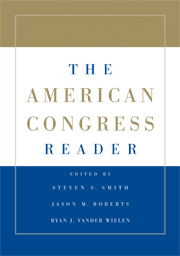Book contents
- Frontmatter
- Contents
- THE AMERICAN CONGRESS READER
- PART I THE AMERICAN CONGRESS: MODERN TRENDS
- PART II REPRESENTATION AND LAWMAKING IN CONGRESS: THE CONSTITUTIONAL AND HISTORICAL CONTEXT
- PART III CONGRESSIONAL ELECTIONS AND POLICY ALIGNMENTS
- PART IV MEMBERS, GOALS, RESOURCES, AND STRATEGIES
- PART V PARTIES AND LEADERS
- PART VI THE STANDING COMMITTEES
- PART VII THE RULES OF THE LEGISLATIVE GAME
- PART VIII THE FLOOR AND VOTING
- PART IX CONGRESS AND THE PRESIDENT
- 28 Presidential Veto Messages
- 29 Presidential Signing Statement
- 30 Veto Bargaining
- 31 The Dynamics of Legislative Gridlock, 1947–1996
- 32 The Politics of Shared Power
- 33 Conscience of a Conservative
- PART X CONGRESS AND THE COURTS
- PART XI CONGRESS, LOBBYISTS, AND INTEREST GROUPS
- PART XII CONGRESS AND BUDGET POLITICS
- PART XIII FURTHER READINGS ON CONGRESSIONAL POLITICS
33 - Conscience of a Conservative
Published online by Cambridge University Press: 05 June 2012
- Frontmatter
- Contents
- THE AMERICAN CONGRESS READER
- PART I THE AMERICAN CONGRESS: MODERN TRENDS
- PART II REPRESENTATION AND LAWMAKING IN CONGRESS: THE CONSTITUTIONAL AND HISTORICAL CONTEXT
- PART III CONGRESSIONAL ELECTIONS AND POLICY ALIGNMENTS
- PART IV MEMBERS, GOALS, RESOURCES, AND STRATEGIES
- PART V PARTIES AND LEADERS
- PART VI THE STANDING COMMITTEES
- PART VII THE RULES OF THE LEGISLATIVE GAME
- PART VIII THE FLOOR AND VOTING
- PART IX CONGRESS AND THE PRESIDENT
- 28 Presidential Veto Messages
- 29 Presidential Signing Statement
- 30 Veto Bargaining
- 31 The Dynamics of Legislative Gridlock, 1947–1996
- 32 The Politics of Shared Power
- 33 Conscience of a Conservative
- PART X CONGRESS AND THE COURTS
- PART XI CONGRESS, LOBBYISTS, AND INTEREST GROUPS
- PART XII CONGRESS AND BUDGET POLITICS
- PART XIII FURTHER READINGS ON CONGRESSIONAL POLITICS
Summary
In this article, appearing in the New York Times, Rosen interviews Jack Goldsmith, former head of the Office of Legal Counsel, and recaps the events of his short and tumultuous tenure. Goldsmith declares that a major failure of the Bush administration in the war on terror has been its unwillingness to seek congressional support. The Bush administration's “go-it-alone” attitude, in Goldsmith's view, has diminished the power of the presidency.
In the fall of 2003, Jack L. Goldsmith was widely considered one of the brightest stars in the conservative legal firmament. A 40-year-old law professor at the University of Chicago, Goldsmith had established himself, with his friend and fellow law professor John Yoo, as a leading proponent of the view that international standards of human rights should not apply in cases before U.S. courts. In recognition of their prominence, Goldsmith and Yoo had been anointed the “New Sovereigntists” by the journal Foreign Affairs.
Goldsmith had been hired the year before as a legal adviser to the general counsel of the Defense Department, William J. Haynes II. While at the Pentagon, Goldsmith wrote a memo for Defense Secretary Donald Rumsfeld warning that prosecutors from the International Criminal Court might indict American officials for their actions in the war on terror. Goldsmith described this threat as “the judicialization of international politics.” No one was surprised when he was hired in October 2003 to head the Office of Legal Counsel, the division of the Justice Department that advises the president on the limits of executive power.
- Type
- Chapter
- Information
- The American Congress Reader , pp. 374 - 380Publisher: Cambridge University PressPrint publication year: 2008
- 1
- Cited by

